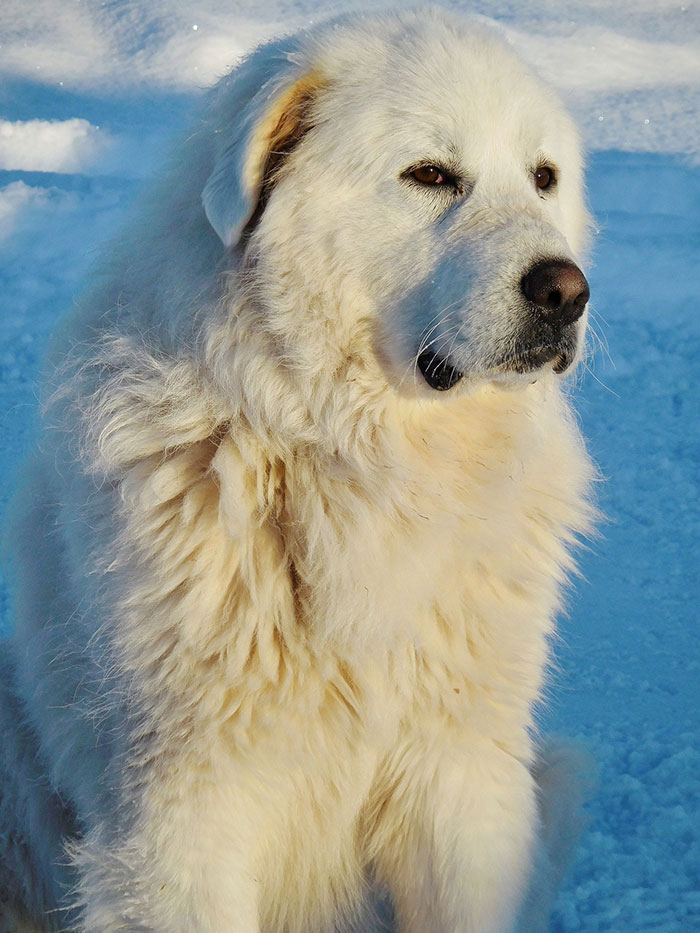
Is a Great Pyrenees Right for You? Consider the Good and the Bad
The Great Pyrenees is a breed known for their strong, large build and beautiful thick white coat that gives them a majestic appearance. Many people consider them to be one of the most beautiful dog breeds. The Great Pyrenees is a popular pet and for good reason. They are intelligent, loyal pets with a steady temperament. But are there any downsides to this breed? Do Great Pyrenees have any health issues that should be a red flag?
Let’s take a closer look at the positives and negatives of this popular dog breed.
What are Great Pyrenees?
The Great Pyrenees Mountain dog originates from France and was bred to guard and protect livestock from predators such as wolves. The Great Pyrenees was once known as the royal dog of France. Their white coats allowed them to blend in with the sheep they protected. The breed descends from ancient mastiff-type dogs and comes from the French side of the Pyrenees Mountains which separates France and Spain.
The first Great Pyrenees came to the United States in company with Marquis de Lafayette. But it wasn’t until 1933, more than a century later, that the dogs were recognized by the American Kennel Club! Today, the Great Pyrenees ranks 71st among the breeds registered by the AKC.
Common Personality Traits of The Great Pyrenees Mountain Dog
- Affectionate – Great Pyrenees are confident, gentle, and affectionate toward their family. Great Pyrenees generally have a great temperament and are patient and tolerant of children.
- Strong willed – The breeding plays a lot into the stoic nature and appearance of this dog. They are independent and strong willed pups at times.
- Fearless – The Great Pyrenees was bred to protect their flock from predators, such as wolves. The job called for a large, powerful, brave, and wary dog.
- Confident – The Great Pyrenees was bred to work independently, for days or weeks at a time. They are unaccustomed to taking a lot of orders.
- Thrive in cold weather – Due to their thick coats and oversized frame, this breed does better in cold weather and tends to be sensitive to heat. They also drool quite a bit, especially after drinking water.
- Patient and gentle – The Great Pyrenees is placid in the home and gentle with children. They have a watchful, protective nature and can be more serious than other breeds.
- Moderately active – Giant breed dogs like the Great Pyrenees tend to be only moderately active. If you are looking for a lower energy and active dog, a Great Pyrenees is a good choice. A couple of short or moderate leashed walks daily will satisfy their exercise needs.
- Territorial and protective – This breed is very loyal. They may be quite intimidating if an intruder comes to your home! They tend to be reserved with strangers and overall protective of their families.
Typical Physical Traits of The Great Pyrenees
- Hair Coat – This breed is well known for their beautiful thick double coat that is white with markings of tan, grey, red, or badger in color. Grooming Great Pyrenees is a regular requirement, and Great Pyrenees do shed quite a bit.
- Height – Great Pyrenees are a giant breed of dog. The males can be anywhere between 28–32 inches tall, and females can range from 26–29 inches tall.
- Great Pyrenees Weight – Male: 100–160 lbs. (45–73 kg); Female: 85–110 lbs. (39–52 kg)
Great Pyrenees Health Issues – Be Mindful of Potential Concerns
All dogs have the potential to develop genetic health problems and the Great Pyrenees is no exception. The Great Pyrenees health issues may include the following concerns:
- Hip dysplasia – abnormal development and growth of a dog’s hip joint
- Heart problems, such as tricuspid valve dysplasia
- Osteosarcoma – bone cancer
- Eye problems, such as persistent pupillary membranes, progressive retinal atrophy, and cataracts
- Osteochondritis dissecans – an orthopedic problem
- Patellar luxation – kneecap dislocation
- Bloat – Gastric dilatation-volvulus (GDV) is a serious condition and is fatal if left untreated. Commonly referred to as “bloat,” GDV occurs when a dog’s stomach fills with gas, food, or fluid and subsequently twists. GDV develops without warning and can progress quickly. It is always an emergency.
Friendly Vet Note: When getting a Great Pyrenees from a breeder, you should request some paperwork regarding the health of your new puppy.
The breeder should provide evidence that both the puppy’s parents have hip and elbow certifications from the Orthopedic Foundation for Animals, an OFA heart clearance, and certification from the Canine Eye Registry Foundation that the eyes are healthy.
For more information, The Great Pyrenees Club of America, which is the American Kennel Club parent organization for the breed in the United States, participates in the Canine Health Information Center Program. For a Great Pyrenees to achieve CHIC certification, he must have OFA certification for hips and patellas. Additional certifications may include OFA for elbows, shoulders, heart, and thyroid; a BAER hearing clearance; and Canine Eye Registry Foundation certification for cataracts.
Pet Insurance for Great Pyrenees
Regardless of the breed of dog you choose, pet ownership is a huge responsibility – both timewise and financially. While adjusting schedules to include a new pup comes as second nature to many, thinking about affordable pet care options is often something new pet owners overlook.
But the good news is that you CAN prepare for some of the financial responsibilities of pet ownership!
Pet insurance for dogs can be a helpful tool in keeping your new family member in tip top shape! The very best time to invest in a pet insurance plan for your Great Pyrenees is as a healthy puppy. You can’t predict the future, but having pet insurance is one thing you can do to help alleviate financial burdens of Great Pyrenees health issues later in life.
Purchasing pet insurance for puppies, before any common Great Pyrenees health issues arise, can help protect you from potentially expensive veterinary bills. Pet insurance can also provide financial coverage for the wellness preventative care of your pet (yearly bloodwork, vaccinations, routine dental cleanings). These regular visits can also be expensive over your pet’s lifetime. Investing in a pet insurance plan, like Spot Pet Insurance, while your furbaby is still young helps you to do whatever your pet will need over their lifetime without financial constraints and limitations.
Final Thoughts on Great Pyrenees Best Traits and Health Issues
Great Pyrenees are loving, affectionate, intelligent, and protective companions. They will provide their families years of unfaltering love and happiness.
Be aware of possible Great Pyrenees health concerns, ensure your Great Pyrenees puppy is from a reputable breeder with evidence of good health from both parents, and purchase pet health insurance early on to set you and your pup up for a long life of health and wellness!




